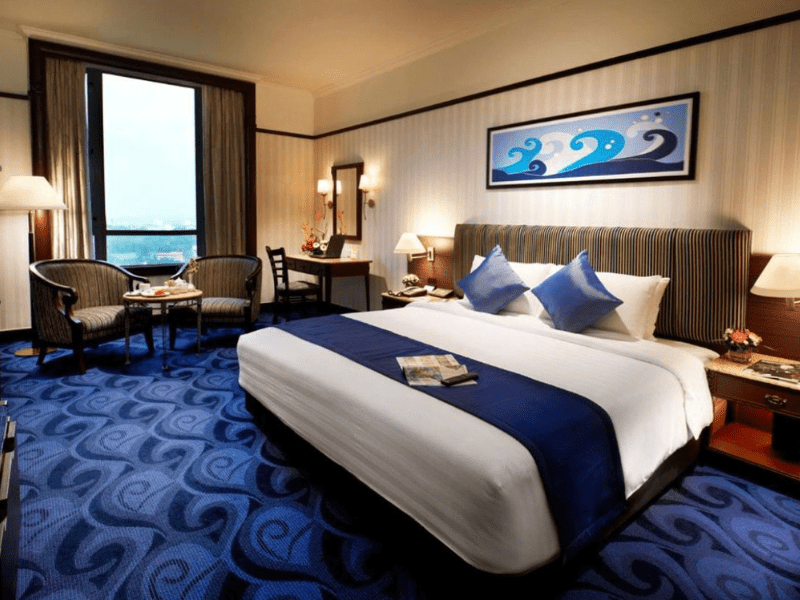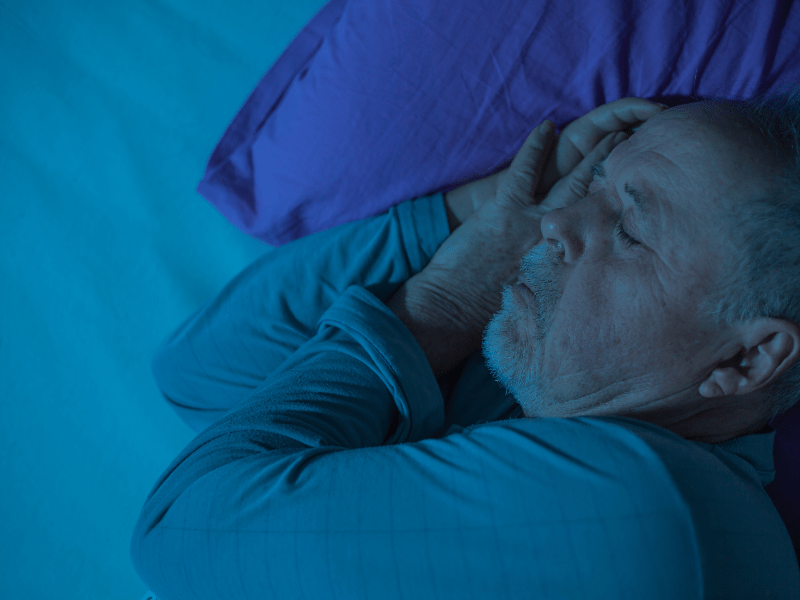Do you often feel tired and out of sync after a long flight, disrupting your sleep routine? This phenomenon is known as jet lag, which affects countless travelers each day.
In this post, we'll explore science-backed strategies to minimize the impact of jet lag on your sleep schedule.
Ready to ensure restful slumbers throughout your journey? Let's dive in!
What is Jet Lag?
Jet lag is a type of weariness you feel when traveling through different time zones. It happens when your body's clock gets out of sync with the new location's hours. For instance, it could be 10 p.m. where you are, but your body still thinks it's 2 p.m. This can mess up your sleep routine.
Signals for jet lag are feeling tired, being unable to fall asleep, and staying sleepy during the day. A few other things may happen as well like irritable feelings and troubles with eating right. It can take some days or even weeks for your body to get used to the new schedule after a trip over time zones.
Causes and Symptoms of Jet Lag
Jet lag is caused by factors such as light exposure, time zone shifts, and changes in circadian rhythm. Symptoms can include fatigue, insomnia, difficulty concentrating, irritability, and digestive issues.
Light exposure
Sunlight helps your body know when to wake up and sleep. It impacts your internal clock or circadian rhythm. When you travel, light exposure changes. This can cause jet lag symptoms.
You can use light to fix this problem. Get a lot of sunlight at your destination during the day. This will help reset your internal clock faster and lower the effects of jet lag. Be careful not to do this too close to bedtime though! Too much light late in the day can make it hard for you to go to sleep at night.
Time zone shifts
Time zone shifts can mess up your sleep. Jet lag happens when you fly across three or more time zones, it's a fact. Your body clock gets confused by new time zones in foreign land.
It thinks it is the old time and does not match with the local time. So, you get bad sleep and feel tired all day long. You may fail to eat or work right too. Just like shift workers who work odd hours face similar issues as jet-lagged people do.
Changes in circadian rhythm
Changes in circadian rhythm can occur when you travel across different time zones, leading to jet lag. Your circadian rhythm is like an internal clock that tells your body when to sleep and wake up.
When you change time zones, it can disrupt this natural cycle and make it harder for you to adjust to the new schedule. This disruption can cause symptoms like sleep disturbance, fatigue, and confusion about when it's daytime or nighttime. It's important to be aware of these changes in your sleep pattern and take steps to minimize their impact on your overall well-being while traveling.
Minimizing Jet Lag Before and During Travel
Adjust light exposure, take melatonin supplements, time your flights wisely, try to sleep during your flight, avoid long layovers in multiple time zones, avoid caffeine and alcohol, and stay active upon arrival. Read on to learn more about these sleep-related travel hacks!
Adjust light exposure
Adjusting the light exposure can help minimize jet lag. Here are some ways to adjust your light exposure before and during travel:
- Spend time outdoors in natural daylight.
- Open curtains or blinds to let in natural light.
- Use a light box or light therapy device to simulate daylight.
- Avoid bright screens (like phones and tablets) before bedtime.
- Wear sunglasses when exposed to bright sunlight.
Take melatonin supplements
If you want to minimize jet lag, taking melatonin supplements can help. Melatonin is a hormone that helps regulate our sleep patterns and is naturally produced in the brain. By taking melatonin supplements, you can boost your body's levels of this hormone and help adjust your circadian rhythm to the new time zone. It's recommended to take a small dose of melatonin, between 0.5 to 3 milligrams, about two to four hours before bedtime.
This can help improve your sleep quality and reduce the effects of jet lag when traveling eastward for longer trips.
Time your flights wisely
Timing your flights wisely is crucial in minimizing jet lag when traveling. It's important to consider the time zones you will be crossing and try to align your flight schedule accordingly.
If possible, choose flights that arrive at your destination during the daytime or early evening, as this can help regulate your body clock and make it easier to adjust to the new time zone.
Avoid scheduling flights that arrive late at night or in the early morning, as this can disrupt your sleep schedule and increase feelings of fatigue. By planning your flights strategically, you can reduce the impact of jet lag on your sleep routine and enjoy a more restful travel experience.
Try to sleep during your flight
Sleeping during your flight is an effective way to minimize jet lag and its disruptive effects on your sleep routine. When you're on a long-distance flight, especially if it's nighttime at your destination, try to get some shut-eye on the plane.
This can help your body adjust to the new time zone and reduce fatigue, insomnia, and irritability caused by jet lag. Check out our article that answers the question of can anemia cause insomnia, which is very informative. Studies have shown that taking melatonin supplements just before sleep can also help alleviate jet lag symptoms. So, make sure you create a comfortable environment with earplugs and a sleep mask to maximize your chances of getting quality rest during the flight.
Avoid long layovers in multiple time zones
Avoiding long layovers in multiple time zones can help minimize jet lag before and during travel.
Avoid caffeine and alcohol
To minimize jet lag and ensure a good sleep routine while traveling, it's important to avoid caffeine and alcohol. These substances can disrupt your sleep patterns and make it harder for you to adjust to new time zones. Instead of reaching for that cup of coffee or glass of wine, opt for water or herbal tea to stay hydrated. Drinking plenty of water while traveling can help reduce the impact of jet lag and keep you feeling refreshed.
So, remember to steer clear of caffeinated drinks and alcohol before and during your journey to minimize the discomfort of jet lag.
Stay active upon arrival
Staying active when you arrive at your destination can help minimize jet lag before and during travel. Getting moving as soon as possible helps regulate your internal body clock and adjust to the new time zone.
Take a walk, stretch, or do some light exercise to keep your energy levels up and combat fatigue. This not only keeps you awake but also helps your body adapt faster to the local time.
So, remember to stay active upon arrival to reduce the effects of jet lag and make the most out of your trip!
Tips for Minimizing Jet Lag After Travel
Limit naps and use earplugs and a sleep mask to promote better sleep quality and aid in the adjustment of your internal clock after travel.
Limit naps
Taking short naps can help reduce tiredness from jet lag. However, it's important to be cautious with napping and not nap for too long. Quick power naps of around 20 minutes don't result in sleep inertia and can actually decrease daytime sleepiness caused by jet lag.
These short naps can give you a boost of energy without disrupting your regular sleep schedule or making it harder to fall asleep at night.
Use earplugs and a sleep mask
Using earplugs and a sleep mask are effective ways to minimize disruptions to your sleep routine after traveling. These accessories can help you fall asleep even in noisy or bright environments, allowing for better rest during your trip.Earplugs, headphones, and eye masks not only block out noise and light but also contribute to more REM (rapid eye movement) time, shorter REM latency (the time it takes to enter REM sleep), less arousal during the night, and elevated levels of melatonin, the hormone that regulates our sleep-wake cycle.
While there is no cure for jet lag, using earplugs and sleep masks can greatly improve your sleeping experience while traveling.
Other Factors That Affect Sleep While Traveling
Unfamiliar sounds, stress, weather, and altitude can all contribute to sleep disruptions while traveling.
Unfamiliar sounds
Unfamiliar sounds can disrupt your sleep while traveling, making it difficult to get a good night's rest. Whether it's the noise of traffic outside your hotel room or the unfamiliar sounds of a new city, these disruptions can lead to sleep disturbances and travel fatigue. Environmental noise can affect both the quality and quantity of your sleep, causing insomnia or sleep deprivation. To minimize this impact, consider using earplugs and a sleep mask to block out any unwanted sounds and create a more peaceful sleeping environment.
By reducing these distractions, you'll be able to improve your sleep quality while on the go.
Stress
Stress can have a big impact on your sleep when you're traveling. It's common to feel anxious and stressed because of the change in routine that comes with travel. And this stress can make jet lag symptoms worse, like feeling tired or having trouble sleeping. So it's important to manage your stress levels before and during travel. This means finding ways to relax and take care of yourself, like practicing deep breathing exercises or listening to calming music.
By reducing stress, you can help improve the quality of your sleep and lessen the effects of jet lag.
Weather
Weather can also impact your sleep while traveling. Environmental conditions, such as noise pollution and temperature fluctuations, can affect the quality of your sleep. If you're not comfortable in your surroundings due to extreme weather conditions or other weather-related factors, it can lead to sleep disturbances and travel fatigue. Additionally, if you're experiencing a significant change in climate or altitude, it may also disrupt your sleep patterns. It's important to consider these weather-related factors when planning for a good night's rest while traveling.
Altitude
Altitude plays a role in how well we sleep while traveling. When we are at a higher elevation, such as in mountainous regions or during air travel, it can affect our sleep quality and contribute to symptoms of jet lag. The main issue with altitude is that it can cause dehydration more easily than lower altitudes. This dehydration can worsen the effects of jet lag and disrupt our sleep routine even further.
Therefore, staying hydrated is crucial when traveling to higher altitudes, helping to minimize the impact of jet lag on our overall well-being.
Conclusion
In conclusion, minimizing disruptions to your sleep routine when traveling and dealing with jet lag is possible by making some simple adjustments. Gradually adjusting your sleep schedule before the trip, managing light exposure, staying active upon arrival, and taking care of your overall well-being can help you get better sleep while traveling.
By following these tips, you can minimize the impact of jet lag and enjoy a more restful journey. Sleep well!
FAQs
1. What is jet lag and how does it affect my sleep?
Jet lag is a condition that occurs when your body's internal clock is disrupted due to traveling across different time zones, which can result in sleep disturbances, fatigue, and difficulty adjusting to the new time zone.
2. How can I minimize disruptions to my sleep routine while traveling?
To minimize disruptions to your sleep routine while traveling, try gradually adjusting your sleeping schedule before your trip, staying hydrated, avoiding caffeine and alcohol close to bedtime, and exposing yourself to natural sunlight or bright light during the day.
3. Are there any medications or supplements that can help with jet lag?
There are some medications available that can help with the symptoms of jet lag, such as melatonin or prescription sleep aids. However, it's best to consult with a healthcare professional before taking any medication or supplement.
4. Can changing my eating habits help reduce the effects of jet lag on my sleep?
Yes, adjusting your eating habits according to the local time at your destination can help regulate your body's internal clock and ease the symptoms of jet lag on your sleep patterns.
5. How long does it take for my body to adjust to a new time zone?
The amount of time it takes for your body to adjust varies from person to person but generally takes about one day per timezone crossed. Establishing a consistent sleeping schedule at your destination can aid in faster adjustment.






















